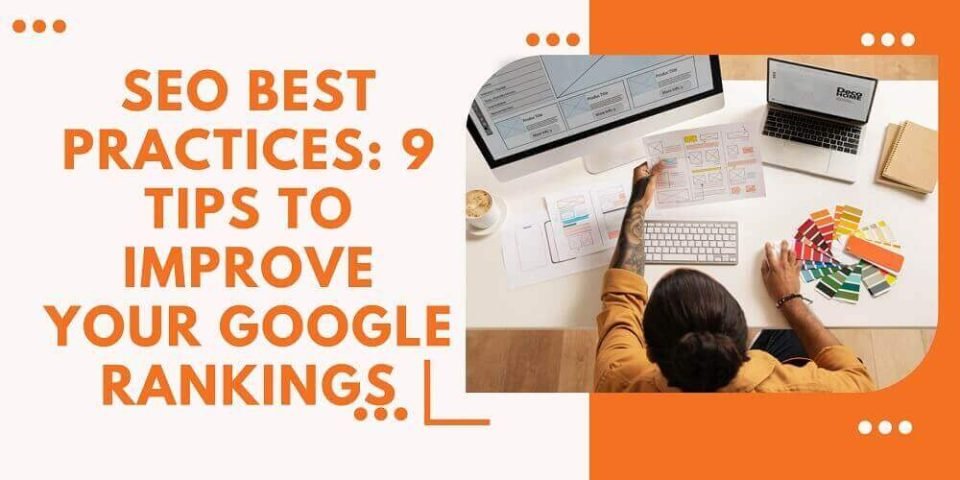Are you looking to improve your website’s visibility on Google? If it’s a yes you’re in the right place! In this article, you will dive into the world of SEO which stands for search engine optimization and explore the 9 valuable tips that can help you boost your Google rankings.
So, let’s get started!
What do you mean by SEO?
Contents
It refers to the process of optimizing a website or web page to improve its visibility and organic (non-paid) rankings on search engine results pages (SERPs). SEO Toronto involves various techniques and strategies aimed at increasing website traffic, attracting relevant visitors, and enhancing the overall user experience.
Types of SEO:
There are three primary types of SEO techniques: on-page SEO, off-page SEO, and technical SEO. Let’s compare them in the table below:
| Types of SEO | Description | Examples |
| On-Page SEO | Optimization within the website content and HTML source code | Keyword optimization, meta tags optimization, internal linking. |
| Off-Page SEO | Strategies performed outside the website to increase its authority website to increase its authority and popularity | Backlink building, social media promotion, influencer partnerships |
| Technical SEO | Optimization of website’s technical elements for search engines | XML sitemap creation, site speed optimization, mobile-friendliness |
9 of the key tips to improve your Google ranking
Now that we have a clear understanding of SEO and its types, let’s dive into the nine key tips to improve your Google ranking:
Conduct keyword research
- Include target keywords in the page title, meta description, headings, and throughout the content.
- Ensure your content provides value, answers user queries, and maintains readability.
- Use descriptive URLs that incorporate relevant keywords.
For instance, a well-optimized URL could be “https://example.com/seo-best-practices-google-rankings.”
Optimize on-page elements
On-page elements refer to the components within a web page that can be optimized for search engines. These include the page title, meta description, headings, and content. Optimizing these elements is crucial as they provide search engines with valuable information about the page’s topic and relevance. To optimize on-page elements, incorporate target keywords naturally, create compelling page titles, write descriptive meta descriptions, and structure content with relevant headings. By doing so, you can improve your website’s visibility and increase the chances of ranking higher on Google
Improve website loading speed
Fast loading speed is crucial for a positive user experience and higher Google rankings. To improve website loading speed:
- Compress images
- Enable browser caching
- Minify CSS/JavaScript files
- Use a content delivery network (CDN)
- Implement lazy loading
- Optimize server response time
- Reduce redirects
- Prioritize visible content loading
- Use a lightweight and efficient website design
Enhance mobile-friendliness
Mobile-friendliness is crucial as more users access the web through mobile devices. Improve your website’s mobile experience with these steps:
- Use a responsive design that adapts to different screen sizes.
- Ensure easy navigation with mobile-friendly menus and buttons.
- Optimize font sizes and spacing for readability on smaller screens.
- Compress images and utilize lazy loading to reduce mobile page load time
Create high-quality, relevant content
- Produce informative, engaging, and unique content that caters to your target audience.
- Include relevant keywords naturally within the content.
- Incorporate multimedia elements like images, videos, and infographics to enhance user experience.
Build high-quality backlinks
Backlinks play a crucial role in SEO, indicating to search engines that your website is trustworthy and authoritative. To acquire quality backlinks, focus on guest blogging, forming content partnerships, and reaching out to influential figures in your industry. Remember, quality matters more than quantity when it comes to backlinks. Aim for links from reputable websites that are relevant to your niche.
Optimize for local search
Optimizing for local search is crucial for businesses targeting specific geographical areas. By doing so, you can attract local customers and improve your visibility in local search results. To optimize for local search, include your business name, address, and phone number (NAP) on your website and local directories. Create a Google My Business profile and encourage customer reviews. These efforts will help your business appear in local map packs and increase your chances of reaching local customers.
Improve user experience (UX)
Improving user experience (UX) is crucial for enhancing website performance and Google rankings. To achieve this, ensure easy navigation, fast loading times, and visually appealing design. Implement user-friendly features such as search bars, breadcrumbs, and related content suggestions. Focus on accessibility and make your site mobile-friendly. By prioritizing UX, you create a positive browsing experience, leading to increased user engagement and better search engine rankings.
Monitor and analyze your website’s performance
- Use SEO tools such as Google Analytics to track the traffic and conversion rate of your website.
- Analyze the data to identify areas in need of improvement to bring your SEo campaign back to the track.
- Regularly check your website’s rankings for target keywords and make necessary adjustments.
Conclusion
By implementing these nine SEO tips, you can significantly improve your website’s visibility and rankings on Google. Remember to focus on providing valuable content, optimizing your website’s technical elements, and building a strong online presence through quality backlinks. Stay consistent, monitor your performance, and adapt your strategies based on data-driven insights. Good luck with your SEO journey!
About The Author: Karan Sharma is the co-founder & CEO of Kinex Media Inc. He intends to bring a massive transformation in eCommerce web designing & development. His team of talented IT professionals knows the secret of getting huge conversions.

